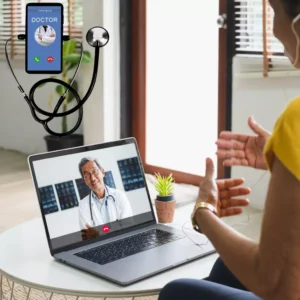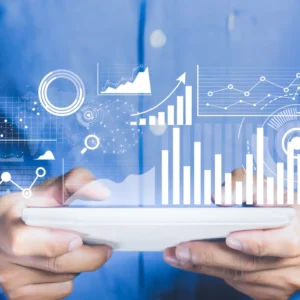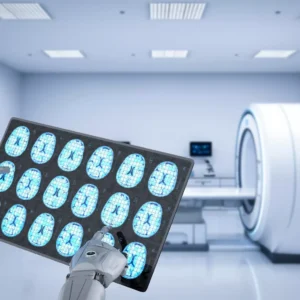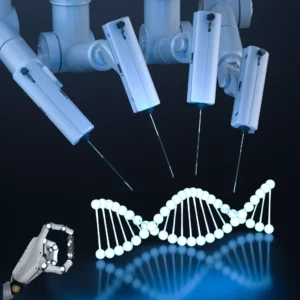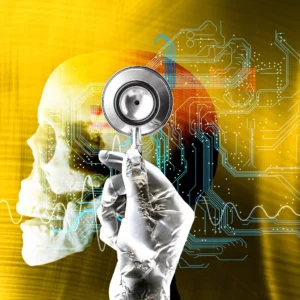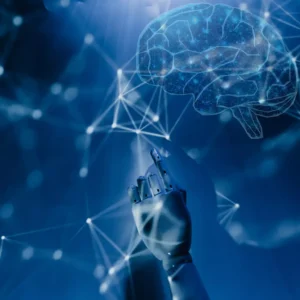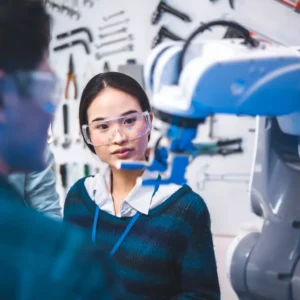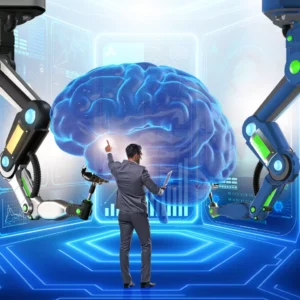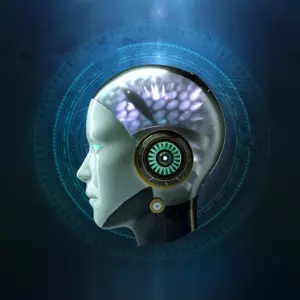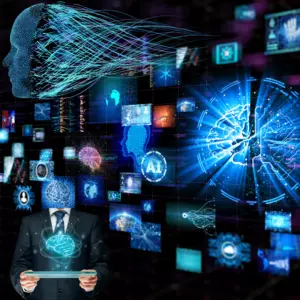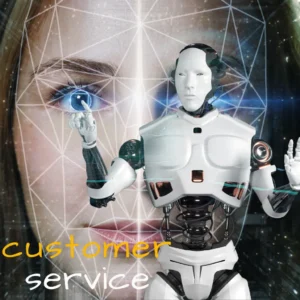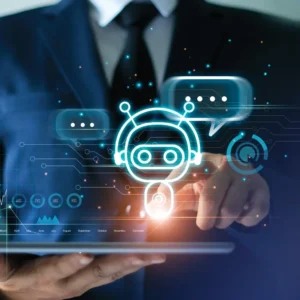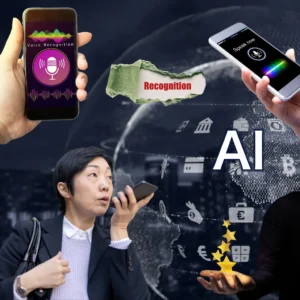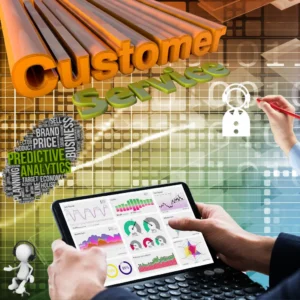
A Proactive Approach
AI in Predictive and Preventive Care
In the ever-evolving world of healthcare, the phrase “prevention is better than cure” has never been more pertinent.
Enter AI in Predictive and Preventive Care: a revolutionized approach turning this age-old adage into an actionable reality. Imagine detecting a disease before it shows symptoms or receiving tailor-made health advice, all thanks to sophisticated algorithms and data analysis.
This article ventures into the transformative power of AI, shedding light on its potential to identify potential health threats and educate the public, amplify public health campaigns, and fundamentally alter healthcare economics.
As we explore, we’ll also touch upon the ethical nuances and the steps to empower healthcare professionals with these tools. Join us as we chart a course into a future where healthcare is not just reactive but intensely, intelligently proactive.
Table of Contents

Arindam Roy
An Automation Consultant with 25+ years of IT Experience
The Importance of Preventive Care
An old saying resonates profoundly in the vast healthcare landscape: “An ounce of prevention is worth a pound of cure.” This wisdom underlines the pivotal role of preventive care. Historically, medical treatments primarily focused on reactive maintenance – addressing ailments after they manifest. However, the tide is changing, with an increasing emphasis on halting diseases before they begin.
Enter AI in Predictive and Preventive Care. This revolutionary approach shifts the paradigm, focusing on predicting potential health threats before they escalate. The power of AI’s data analytics can unveil hidden patterns, providing early warning signs of ailments like heart diseases or diabetes, which traditionally only became apparent at advanced stages.
But why is preventive care so crucial? Firstly, it promises a better quality of life. Early interventions mean fewer complications, fewer painful treatments, and a healthier life. Secondly, it’s a matter of economics. As bolstered by AI-driven predictions, preventive care can drastically cut healthcare costs. When diseases are thwarted or managed initially, the healthcare system’s financial burden diminishes, leading to potential savings for individuals and nations.
Yet, despite its undeniable benefits, one must ask: Are we leveraging the full potential of predictive analytics for preventive care? Are we adequately fusing traditional healthcare wisdom with the modern prowess of AI? And as we delve deeper into AI’s role in healthcare, what other transformations await us?
Forbes Articles related to AI usage in Healthcare:
AI's Role in Early Detection
Historically, the diagnosis of many health conditions depended heavily on visible symptoms and patient reports. However, in the modern era of medicine, early detection stands as a beacon of hope. This is where AI in Predictive and Preventive Care takes centre stage.
With its ability to rapidly parse vast amounts of data, AI plays an instrumental role in detecting subtle patterns that might escape the human eye. Whether it’s analyzing medical images or sifting through genetic data, the capabilities of AI in early disease detection have expanded far beyond traditional methods. For instance, machine learning models in oncology can spot minute irregularities in mammograms or MRI scans, identifying potential cancerous growths long before they become life-threatening.
Beyond imaging, AI’s predictive analytics dives deep into electronic health records, utilizing every piece of information to its fullest. This means that even a slight change in a patient’s vitals or a subtle pattern in their medical history could flag potential health concerns. Such predictive analytics for preventive care positions AI as a vital ally in the race against time, often providing the critical window for effective interventions.
However, the role of AI continues beyond data analytics. It also encompasses real-time monitoring, where wearable devices backed by AI can provide continuous health surveillance. This constant vigilance ensures that any anomaly, however fleeting, does not go unnoticed.
As we stand on the cusp of a healthcare revolution driven by AI, one can’t help but ponder: How will the fusion of traditional diagnostic methods with AI’s precision further enhance our capabilities? And as these technologies become even more ingrained in our healthcare system, what new avenues for early detection might we discover next?
Tailored Health and Lifestyle Advice
Imagine living in a world where health advice isn’t generic but meticulously crafted for each individual’s unique genetic makeup, lifestyle, and environmental factors. The convergence of AI in Predictive and Preventive Care makes this vision a palpable reality.
Modern AI algorithms are not just about predicting potential health threats; they’re about proactive health enhancement. AI can offer personalized health recommendations that fit each person by analyzing individual data, from genetic sequences to daily step counts. This means that two individuals, even with similar external appearances or lifestyles, might receive vastly different advice based on their distinct health profiles.
Such precise, tailored advice goes beyond just nutrition and exercise. It encapsulates mental health, stress management techniques, and even suggestions on social interactions, painting a holistic picture of well-being. Moreover, as these AI systems continually learn from new data, the advice evolves, ensuring that recommendations remain relevant and practical throughout one’s life journey.
The rise of wearable devices further enhances this personalized approach. These gadgets, powered by AI, monitor and provide real-time feedback. A skipped workout, an erratic sleep pattern, or even increased heart rates during stressful events can trigger AI-driven health education pointers, nudging individuals back to optimal health.
This paradigm shift towards individualized care opens up countless possibilities. However, as we increasingly rely on AI to guide our daily health and lifestyle choices, a thought emerges: How will this tailored approach redefine our understanding of well-being? As AI becomes a more integral companion in our health journey, how will the line between tech-driven advice and human intuition blur?
Educating the Public Using AI Tools
The power of information in the realm of healthcare is unparalleled. But how can one discern the signal from the noise in an age of information overload? This is where AI in Predictive and Preventive Care plays a transformative role, spearheading the mission of effective health education.
In today’s digital age, people often turn to search engines with health queries. However, the plethora of information available might only sometimes be accurate or relevant. AI tools, harnessing vast databases of verified medical knowledge, can provide users with reliable, evidence-based answers. More than that, these tools can customize information delivery based on a user’s health profile, ensuring that the advice is relevant and actionable.
Beyond search, interactive AI-driven health education platforms are emerging. These platforms utilize gamified modules, virtual reality simulations, and even augmented reality experiences to impart knowledge. Whether understanding the intricacies of a surgical procedure or learning the impacts of a specific diet, AI tools make the learning process immersive and engaging.
The promise doesn’t end here. With real-time data integration, these platforms can even offer immediate feedback. For instance, an individual trying to learn the correct posture for a particular exercise could receive instant corrections from an AI tool analyzing their movements.
Yet, as we embrace the marvels of AI in public health education, a contemplative note arises: As AI tools become our primary source of health information, how will they shape our perceptions of health and wellness? And, diving deeper, how might these tools evolve to bridge further the gap between medical professionals and the general public?
Enhancing Large-scale Health Campaigns
Public health campaigns’ reach and effectiveness have always been paramount. As we venture into a digital-centric age, the fusion of AI in Predictive and Preventive Care offers a novel avenue to amplify these campaigns, ensuring they resonate profoundly and effectively.
In the past, health campaigns did not consider individual differences. But AI introduces the potential for granularity. By analyzing demographic data, browsing habits, and even social media trends, AI can tailor messages for specific audiences. This ensures that each individual receives information that’s both relatable and actionable. For instance, based on AI’s insights, a smoking cessation campaign might use different imagery and messaging for teenagers than adults.
Further, AI-driven health education tools can make campaigns more interactive. Instead of passive information consumption, individuals can engage with dynamic platforms that adjust their content based on real-time feedback. Whether it’s a quiz on healthy habits or a simulation on disease spread, these tools ensure that learning is fun and impactful.
But the magic of AI continues beyond individual engagement. On a broader scale, AI can optimize campaign strategies. AI can suggest tweaks and alterations by analyzing the success metrics of different campaign elements in real time. This means that health campaigns can continuously evolve, maximizing their effectiveness.
Embracing AI tools could enhance public health campaigns, allowing health messages to be seamlessly integrated into daily digital activities. As we stand at this exciting juncture, a thought beckons: In an AI-augmented world, how might the nature of health campaigns transform? And how will AI’s potential shape the next significant global health movement?
Navigating Ethical Concerns
With the rapid ascent of AI in Predictive and Preventive Care, it’s not just the technological challenges we must address but the ethical dilemmas that arise alongside. Navigating these ethical concerns becomes paramount as AI integrates deeper into our healthcare fabric.
At the forefront is data privacy. The efficacy of AI-driven preventive care hinges on access to vast amounts of personal health data. While this data empowers AI algorithms to make accurate predictions, it poses significant risks. Unauthorized access, data breaches, or even inadvertent sharing can lead to severe privacy violations. Thus, ensuring robust data encryption and consent protocols is essential.
Next comes the challenge of bias. AI models are trained on data, and any inherent biases in this data can skew the model’s predictions. For instance, if an AI-driven health education tool is majorly trained on data from a particular demographic, its recommendations might not be universally applicable. Addressing such biases ensures that AI tools are inclusive and benefit all sections of society.
Moreover, there’s the looming question of dependency. As AI tools become a staple in preventive care, there’s a potential risk of sidelining human judgment. While AI offers data-driven insights, the human touch, intuition, and experience often make a crucial difference. Balancing AI recommendations with human expertise is, therefore, crucial.
Ethical considerations in predictive care aren’t just roadblocks but guideposts, directing the responsible development and deployment of AI tools. As we embrace the promise of AI in healthcare, a critical reflection arises: How can we ensure that the tools designed to safeguard our health don’t inadvertently compromise our values and principles? And in the intersection of AI and ethics, what new paradigms might emerge?
Economic Benefits and Savings
Harnessing AI in Predictive and Preventive Care is not just a leap in medical science; it’s a stride towards more efficient and sustainable healthcare economics. The potential savings in terms of finances and resources are enormous.
At the core, preventive care is about early intervention, and AI excels. With timely detection and management of potential health risks, we can significantly reduce the burden on healthcare systems. Fewer hospital admissions, shorter stays, and reduced need for intensive treatments translate to massive cost savings. For every dollar spent on AI-driven early detection, many times, that amount can be saved in potential treatment costs.
Beyond the direct treatment costs, the broader economic implications are profound. We’re fostering a healthier workforce by promoting better health and reducing disease incidence. This translates to fewer sick days, enhanced productivity, and a more robust economy. Plus, AI-driven health education ensures that individuals are well-informed, making them more likely to use cost-effective preventive measures.
However, it’s not just about saving money. The dedicated resources can be reallocated to other pressing healthcare needs, ensuring more individuals can access quality care. AI tools can bridge gaps in regions with scarce healthcare resources, ensuring that even remote communities receive timely health advice and interventions.
As we integrate AI tools deeper into our healthcare blueprint, the promise of economic efficiency becomes clearer. But, it prompts an intriguing thought: As we save more with AI in preventive care, how might we reinvest these savings to revolutionize healthcare further? And in a world where healthcare becomes more affordable and accessible, what new challenges and opportunities might surface?
Equipping Healthcare Workers with AI Tools
In the quest for leveraging AI in Predictive and Preventive Care, the focus isn’t solely on the patients. Equally vital is equipping our healthcare professionals with these cutting-edge tools, ensuring they remain at the forefront of medical innovation.
Imagine a doctor who can cross-reference symptoms against thousands of medical journals, case studies, and patient records in seconds. This is the potential that AI tools offer. By sifting through vast amounts of data at unprecedented speeds, they provide healthcare workers with insights that would be humanly impossible to gather. This not only speeds up diagnosis but also enhances its accuracy.
Nurses, too, can benefit immensely. AI-driven health monitoring systems can instantly alert them about critical patient vital changes, allowing timely interventions. Moreover, routine tasks, such as patient record updates, can be streamlined, enabling nurses to dedicate more time to direct patient care.
For therapists and counsellors, AI tools can assist in tracking patient progress, identifying potential triggers, and even predicting episodes based on data patterns. This ensures that care is not just reactive but proactive.
However, more than merely having these tools is required. Training healthcare professionals for preventive care with AI integration is essential. They must understand the functionalities and underlying principles, ensuring they can make informed decisions even when AI recommendations seem counterintuitive.
As we march towards a future where AI tools become commonplace in healthcare settings, it’s vital to remember that these tools are assistants, not replacements. They enhance human capabilities but keep them distinct. So, as our healthcare workers adapt to this AI-augmented reality, How will the dynamic between human intuition and AI-driven data evolve? What new avenues might open when both work in perfect harmony?
Case Studies in Successful Prevention
The power of AI in Predictive and Preventive Care isn’t just theoretical; real-world case studies have illuminated its transformative potential.
One notable instance is the deployment of AI tools in early cardiac disease detection. An AI system could easily predict potential cardiac events by analyzing electronic health records, wearable device data, and genetic information. This timely identification led to preventive interventions, ultimately reducing hospital admissions and saving numerous lives.
Diabetes prevention is another triumph. AI algorithms, trained on vast datasets, could identify subtle patterns humans might miss. In one pilot program, the AI system flagged individuals at high risk of developing Type 2 diabetes within the following year. Through targeted AI-driven health education and lifestyle recommendations, a significant percentage of these at-risk individuals showed improved health metrics, effectively delaying or even preventing the onset of diabetes.
Mental health care has also witnessed AI’s preventive prowess. By monitoring online communications, specific AI tools could detect early signs of depressive or suicidal ideation, prompting timely interventions. This proactive approach, underpinned by AI’s data analysis capabilities, was instrumental in providing help before a crisis escalated.
Even in areas like infectious diseases, AI has shown promise. AI systems have predicted potential outbreaks by analyzing global travel patterns, search engine queries, and news reports, enabling public health authorities to take preemptive measures.
While these case studies spotlight AI’s preventive potential, they also underscore the importance of human-AI collaboration. The synergy between AI’s predictions and human interventions drove success in each instance.
As we witness more success stories like this, it raises questions about what other medical conditions could be better managed or prevented using AI. How might our whole concept of preventive care shift as these tools keep getting more innovative and sophisticated?
Envisioning the Future of Proactive Care
The impact of AI in Predictive and Preventive Care has already been profound. But when we peek into the future, the horizon promises even more groundbreaking innovations, ushering in an era where healthcare is not just responsive but predominantly proactive.
In the not-so-distant future, our wearable devices could do much more than count steps. Integrated AI systems might continuously monitor our vitals, detecting anomalies in real time and alerting us even before we notice symptoms. Such preemptive alerts could differentiate between a timely intervention and a full-blown medical emergency.
Further, imagine AI-driven health education platforms that adapt to our unique health profiles. They could provide personalized nutrition advice, exercise regimens, and mental health tools tailored to our genetics, lifestyle, and environment. It’s health advice that truly understands us, ensuring maximum efficacy.
The concept of ‘doctor visits’ could also transform. Instead of periodic check-ups, continuous AI-driven monitoring might provide healthcare professionals with a real-time health dashboard for each patient. They could intervene when they spot potential risks rather than waiting for the next appointment.
However, with such advancements also come challenges. As AI tools gather more personal health data, ensuring privacy and security will be paramount. Moreover, balancing automation and human touch will be crucial as AI becomes more integral in proactive care.
So, as we stand at this pivotal juncture, the future of proactive care is vibrant and packed with potential. AI tools will likely be our allies in this journey, ensuring timely, personalized, and preventive healthcare. But it makes one wonder: How might our relationship with health and wellness transform in a world where AI predicts and prevents health risks with unparalleled accuracy? And what new paradigms in healthcare will we need to navigate?
In Conclusion: AI's Transformative Role in Predictive and Preventive Care
The promise of AI in Predictive and Preventive Care has unfurled a new horizon in healthcare, bridging gaps and setting transformative benchmarks. Through early disease detection, AI tools have already showcased potential, addressing challenges like cardiac events and impending diabetes with noteworthy efficacy. The paradigm shift towards a proactive approach ensures that interventions occur not at the crisis point but well before.
Wearable devices and continuous AI-driven health education are the precipices of redefining ‘doctor visits’. With real-time monitoring and personalized health recommendations, the boundaries of patient care are expanding, leading to a healthcare landscape where both the patient and the professional are better informed, engaged, and prepared.
Economic ramifications are also evident. Economies can anticipate considerable savings by investing in predictive analytics for preventive care. Fewer emergencies and hospital admissions mean reduced healthcare burdens, underlining the potential economic impacts of AI prevention.
Yet, as AI becomes integral in shaping this proactive future, ethical considerations rise to the forefront. The balance between unparalleled access to personal health data and the sanctity of privacy remains a dominant concern. Moreover, while AI tools pave the way, the human touch, empathy, and experience finalize the journey.
Equipping healthcare workers with AI tools is not just about technology but also about training them to harmonize the synergy between machine intelligence and human intuition. And as seen through various case studies in successful prevention, this collaboration is crucial.
Public health campaigns, once generalized, now have the potential to be more tailored, impactful, and wide-reaching. As we move towards the future, healthcare will become a proactive dance of interventions rather than just reactive measures.
Reflecting on our journey, we must ask: As AI’s role in preventive care deepens and evolves, how will our societal definitions of health, well-being, and medical intervention transform? The answer lies in a future where AI predicts and empowers individuals to prevent and thrive.
Related Articles
- AI in Telehealth: Revolutionizing Remote Care
- Navigating the Next: AI’s Role in Healthcare Predictive Analytics
- Transforming Medical Imaging with AI Capabilities in Radiology
- AI in Genetic Data Analysis: Personalizing Medicine
- AI in Diagnostics: A New Era of Precision and Accuracy
- Smart Hospitals: The Role of AI in hospital operations
- Mental Health Tech: AI-powered Mental Health Apps for Assessment and Therapy
- AI-Powered Drug Discovery: A Revolution in Pharma
- Medical Robots Enhanced by AI: Transforming Surgeries and Care
- Wearable Health Tech: AI-driven health wearables
- AI’s role in chronic disease management
- Neural Interfaces and AI: Bridging Minds and Machines
- Digital Health Platforms: The Power of AI Integration
- AI in Epidemiology: Predicting and Controlling Outbreaks
- AI in Rehabilitation: Personalized Recovery Pathways
- AI in Predictive and Preventive Care: A Proactive Approach
- AI in Home Healthcare: Personal Health Management
- Revolutionise Healthcare with IPA Tools: Streamlining Processes, Improving Efficiency, and Enhancing Patient Care
- Other Articles on AI Usage in Healthcare
- Other Articles on AI usage in different industries

